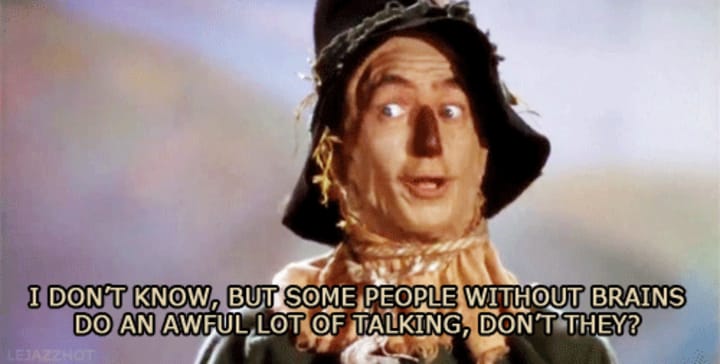30 Curious and Obscure Words, Phrases, & Insults (Which Are Totally Not All About One Specific Tremendously Stable Genius)
Nope... this literary litany of creatively cromulent words aren't applicable to a very particular individual at all...

Lexicography is a wonderful thing.
The study of words and language, the strange and fascinating ways in which these words came to be, and how they have linguistically evolved over time, is a subject ripe for intellectual curiosity.
However, there are some people — (not to name names) — who are so childishly petulant, so wilfully ignorant of anything and everything that doesn't get fed to them trough-like through TV and Twitter, and (incredibly) so intentionally under-educated that they can barely read or write, because they simply don't have any intellectual curiosity, and they simply don't want to learn how to read or write at the level of a regular human adult — (again: not naming names) — that they just wouldn't care in the slightest about how me even using the term "lexicography" is incorrect, because the proper word for this whole subject is "lexicology" (and nor would they care about how weird and cool it is that when you have to differentiate "lexicology" and "lexicography", your best tools for the job are, in fact, lexicology and lexicography themselves).
Which brings us to this list of (what I find to be) quite interesting old words, phrases, and insults from times gone by, that can be used to describe anyone worthy of insulting, both without resorting to traditional modern-day profanity, and also without the insulted party being smart enough to know that you're insulting them in the first place.
(Once again: nobody in particular comes to mind...)
***
#1. Abydocomist

An obsolete word in today's lexicon, the etymology of "abydocomist" stems from Ancient Greek, and is an expression supposedly minted out of the name of an Ancient Egyptian city named Abydos, which the Greeks declared to be full of proudly dishonest, slanderous people — hence, an "abydocomist" is defined as: "a liar or sycophant who boasts of his falsehood."
(e.g. — "He was clearly a compulsive abydocomist when he said he'd been taping their conversations, and then admitted there weren't actually any tapes, but never apologised for lying.")
#2. Bayard

There are a few colour- and horse-based definitions for "bayard," but the primary one for our purposes herein is: "one that is self-confident through ignorance; one firmly equipped with blind assurance." Relatedly, "bayardism" is defined as "ignorant presumption"; and another definition for the original derivation marks it as meaning: "a clownish, foolish person."
(e.g. — "He still thinks he can stop illegal immigration with a giant wall? Does he think this is Westeros? What an absolute bayard.")
#3. Busy-Idle

An adjective from the 1600s, "busy-idle" refers to someone being "busily employed in trivial matters." It's also known by the delightfully Roald Dahl-esque alternatives: "niffle-naffling,""fiddle-faddling," and "spuddling."
(e.g. — "Instead of putting in the elbow grease necessary to run a country, he was busy-idle creating a Fake News Awards ceremony, which was ITSELF a fake awards ceremony.")
#4. Cockalorum

Either etymologically concocted out of the the Dutch onomatopoeic dialect term "kockeloeren" (“the cry of a rooster”), or from the (to-be-expected) English word "cock" (with an "a" + a Latin "-lorum" added for flair), "cockalorum" is defined as "a self-important person,""a strutting little fellow," and "a person who makes empty boasts."
(e.g. — "A secure person wouldn't have to keep declaring how big their hands are, and their nuclear button is, in order to bolster their fragile ego over their tiny cockalorum.")
#5. Cumberworld

Not used nearly as often as the more commonly known adjective "cumbersome" (with both words coming from the verb "cumber," which originally was defined as "to destroy utterly"), a "cumberworld" (also known as a "cumberground") is "someone who is so worthless and useless, they just serve to take up space", thus "cumbering the world".
(e.g. — "There is nothing more cumberworldly than working less than 2 hours a day, spending the rest of your waking hours tweeting and shitting, then going to bed at 6:30 PM with a remote for your three TVs in one hand, and a cheeseburger in the other, while Puerto Rico STILL struggles to rebuild itself after the hurricane that struck it over 100 days ago.")
#6. Dalcop

Essentially meaning "a dull-head" — with "cop" being an old word for "head" — a "dalcop" is defined as "a particularly stupid person," "an idiot," and/or "a mad-head." Similarly, there's the variation of "harecop," which is a “hare-brained” person.
(e.g. — "He is such a dalcop if he thinks anyone's buying the notion that he's in perfect physical or mental health. Because, y'know, people have EYES...")
#7. Drate-Poke

A quaint old English word that sounds like the name of a rich Victorian country estate (because "Drate-Poke Manor" feels like it should be a place that exists, right?), a "drate-poke" is "a drawler" or "one who speaks indistinctly."
(e.g. — "Those dentures he pretends he doesn't have sure did make him sound like a drate-poke when he tried to say 'United States,' but instead came out with 'Unided Schates'...")
#8. Fanfaronade

Derived from the Spanish words "fanfarrón" and "fanfarrónada" (developed to describe "the verbal claptrap blared by blowhards"), a "fanfaron" is a boastful braggart, and "fanfaronade" is their empty and shameless swaggering self-promotion.
(e.g. — "Everyone could see through the absurd fanfaronade of him saying his inauguration crowds were bigger than Obama's.")
#9. Flub the Dub

An old American slang term (also known as "flub-dubbing"), to "flub the dub" means to "avoid one's work or duty," "to think, work, and move sluggishly and haplessly," and "to fail by blundering."
(e.g. – "Boy, he really flubbed the dub when he tried to sing along and act as if he knew the words to the national anthem.")
#10. Fustilarian

Possibly etymologically linked to the word "fustilugs" (which sounds like a lost Harry Potter spell), and perhaps best known as an insult exclaimed by Falstaff in Shakespeare's Henry IV, Part II — (quote: "Away, you scullion! You rampallion! You fustilarian! I'll tickle your catastrophe!") — there are a couple of definitions for "fustilarian": one is "a low fellow; a stinkard; a scoundrel," and the other is "someone who stubbornly wastes time on worthless things."
(e.g. – "Maybe he should stop being a rampant fustilarian, and get on with fixing the economy for the working classes who voted for him, instead of going to Mar-A-Lago all the goddamn time to see his rich friends whom he's truly looking out for by cutting taxes to their multi-million dollar benefit.")
#11. Gillie-Wet-Foot

A wonderful wee phrase that you should only be able to hear in your mind be spoken with the voice of Billy Connolly, a "gillie-wet-foot" is an old Scottish term for "a worthless fellow who gets into debt and runs off" — and although its other definition isn't necessarily relevant to mention, I thought it was fucking hilarious that it can also mean "a running footman; also, a bum-bailiff."
A BUM-BAILIFF!

Ahem.
But anyway:
(e.g. – "I bet his Scottish mother called him a gillie-wet-foot once or twice in her life, whenever he bankrupted his innumerable failed business ventures, then jumped ship and carried on as if he hadn't lost millions in the process.")
#12. Gnashgab

A northern English word from the 18th century, a "gnashgab" refers to "someone who only ever seems to complain." A similar phrase would be "nashgab" or "nashgob," which describes "garrulous or impudent talk."
(e.g. – "His Twitter feed is nothing but an infinite stream of putrid gnashgabbing.")
#13. Greenhorn

Hypothetically etymologically derived from either Middle English, misappropriated German, 17th century jewellery-making jargon, or simply referring to an animal with horns that are young and green, the phrase "greenhorn" is American slang for "a person who is new to — or inexperienced at — a particular activity."
(e.g. – "Well, what did you THINK was going to happen when you let an orange-tinted greenhorn into the Oval Office?!")
#14. Huff-Snuff

A phrase from the 1500's, self-explanatorily combining "huff" and "snuff" (with both denoting "anger"), a so-called "huff-snuff" is "a fierce, bullying person," "a conceited fellow who gives himself airs, and is quick to take offence," and one "who scoffs loudly at others, but remains entirely oblivious to his own misdeeds."
(e.g. – "This fucking guy, the ultimate huff-snuffer, sitting there on his porcelain throne, roasting all the famous liberal men exposed and shut down in the wake of Weinstein, yet blithely acting as though he's not one of the worst offenders to ever stalk and stain the entertainment industry, the hypocritically ignorant shitweasel...")
#15. Joblijock

A piece of old Yorkshire dialect from the 19th century, "joblijock" is a word for "anything tending to interfere with domestic comfort or peace," as well as "the name of the cock turkey," or just "a turkey-cock."
(e.g. – "What a joblijock move, stirring up racial tensions for his own amusement and benefit, and then refusing to commit to condemning the neo-Nazis and white supremacists wreaking hate-filled havoc in his name. He truly is a turkey-cockalorum.")
#16. Kibitzer

First known to have been used in the 1920's, "kibitzer" is a Yiddish term for describing — either generally, or specifically with regards to someone in a card game — "one who looks on and often offers unwanted advice or comment" about anything and everything.
(e.g. – "Nobody wants criticism about their appearance from the kibitzer schmuck whose face looks like Satan's puckered asshole.")
#17. Klazomaniac

Sourced from the Greek word "klazo" (meaning "to scream"), and first coined as part of a diagnosis of "klazomania" in the 1920's by a doctor observing a patient with post-encephalitic Parkinsonism (which is related to the maladies suffered by the patients in the Robin Williams/Robert De Niro film, Awakenings), a "klazomaniac" is "a person who seems to only be able to speak by shouting."
(e.g. – "Is he a klazomaniac, or is he just deaf? Or both? Because either way, it's the only reason I can think of, for him to be perpetually bellowing 75% of everything he says out loud...")
#18. Lubberwort

Originally a 16th century name for an imaginary plant with intelligence-sapping properties, a "lubberwort" is both a type of "food or drink that makes one idle and stupid" (i.e. "food of no nutritional value/junk food"), and subsequently, "a nickname for a lethargic, fuzzy-minded person".
(e.g. – "With a daily diet of nothing but fried chicken and cheeseburgers and steaks and candy and cake and Diet Coke, it's no surprise his lubberworty food choices make him a lubberwort in the brain department.")
#19. Mumpsimus

A surprisingly cute insult that sounds like a yet-to-be-caught Pokémon, this word supposedly originates from a story about an illiterate priest who, while saying mass, mistakenly said "mumpsimus," instead of the correct word, "sumpsimus" (Latin for "we have taken"). When the priest was corrected soon after, he refused to change his "mumpsimus" for his critic's "sumpsimus."
As a result, a "mumpsimus" is "a person who obstinately adheres to old customs or ideas, in spite of evidence that they are wrong or unreasonable."
(e.g. – "♪♫ Everything he's ever done, and everything he'll ever do, and every place he's coming from, and everywhere he's going to... IT'S A SIN!! ♫♪ (And also, entirely the definition of a mumpsimus.)")
#20. Ninnyhammer

Perhaps etymologically a shortened alteration of "an innocent" (the "n" from the "an" thusly attached to the "innocent" noun), with "hammer" adding a little punch at the end, a "ninnyhammer" is basically just "a simpleton" or "a fool". This word has mostly fallen by the wayside, but you can find it being used by Tolkien in The Lord of the Rings. Quoth the book(s): "You're nowt but a ninnyhammer, Sam Gamgee!"
(e.g. - "Only a ninnyhammer would let a reporter roam free through their dumpster-fire operation for nearly a year, unimpeded, with the express purpose of writing a book about it all, which said reporter hid from nobody, but nobody cared, because everybody's a ninnyhammer in that house.")
#21. Nod-Crafty

A term coined in the early 1600's, a "nod-crafty" is someone who is "given to nodding their head with an air of great wisdom that they don't actually have." On a related note: if a "nod-crafty" is smart enough to keep their mouth shut, they are then also a "mumbudget," which is an old phrase for "keeping quiet".
(e.g. — "He's an avid nod-crafty at every important political meeting he's dragged to, where everyone can tell he doesn't understand a word being said, he doesn't care to have any of it explained to him, and he desperately just wants to leave the room to go back to bed to watch Fox News (for the compliments) and Sesame Street (for the alphabet he never memorised).")
#22. Scobberlotcher

Another 1600's word, credited by John Aubrey in his book, Brief Lives, to the then-President of Oxford's Trinity College, Dr. Ralph Kettell, who supposedly had an inventive way with words when it came to flinging invective at the College undergraduates, with his language-gobblefunking efforts including "rascaljacks," "tarrarags," "blindcinques," and our featured word herein — "scobberlotchers."
Possible antecedents include the regional English phrase, "scopperloit" (stemming from the Dutch "leuteren," which is where we get the word "loiter"), and the other possible source may be "scoterlope" ("to wander aimlessly").
In any event, "scobberlotcher" ultimately means "an idle person," and "someone who never words hard."
(e.g. — "If he weren't the world's worst scobberlotcher, he might have gotten away with colluding with the Russians, but sadly (for him), he was too lazy to even pull off treason properly.")
#23. Scogginistic

Directly synonymous with the word "balatronic" (which is defined as simply "a buffoon"), "scogginistic" takes it a step further, by being the definition of "a dangerous buffoon."
(e.g. — "I don't want to live through the apocalypse because of a scogginistic douchebag sparking a war with North Korea over a childish tête-à-tête of juvenile playground insults flung across Twitter.")
#24. Skelpie-Limmer

A tricky word to define, this one. Certainly borne from old Scots dialect, "skelpie-limmer" was created by the Scottish poet, Robert Burns.
However, different dictionary sources diverge on the individual and combined meanings of both words. For instance: "skelpie" can mean "deserving to be smacked; naughty", and the addition of "limmer" then makes it specifically directed towards "a mischievous girl, a little hussy" (ouch; bit harsh). But then, "skelpie" can also mean "a little-worth person" (with "skelper" and "skelpin'" defined as "striking" or "slapping with an open hand"), and "limmer" (or "limmar") can mean "a scoundrel," "equivalent to a thief," and/or "a woman of loose manners."
(And that's not even going into Urban Dictionary's entry for the meaning of "skelpie", which is... interesting.)
For simplicity's sake, however, we'll go for the definition of "skelpie-limmer" that states it as meaning "a badly-behaved child."
(e.g. — "Remember that time when he unapologetically shoved that head of state out of his way to stand in front of that guy, and he just smugly re-adjusted his jacket lapels, and puffed out his chest because he felt so proud of himself? He's a total skelpie-limmer, because he really is just a petulant man-baby.")
#25. Slumguzzler

A brilliant Old West slang term from the 1800s (that also sounds like a candy made by Willy Wonka), "slumguzzling" — and therefore, a "slumguzzler" — means "to engage in deceptive or fraudulent behaviour."
(e.g. – "Oh, man, I cannot wait for Mueller to uncover all of this administration's slumguzzling!")
#26. Snollygoster

An American political slang term that appeared in the US in the late-19th century, "snollygoster" — (possibly derived from "snallygaster", being a mythical beast that preys on poultry and children) — refers to "a shrewd, unprincipled person," and "a politician who cares more for personal gain than for serving the people."
(e.g. — "He's definitely a snollygoster, no doubt about it... but he might just be a snallygaster, as well, considering how he eats literal buckets full of chicken, and his sexual harassment allegations do involve a number of underage girls, sooooo...")
#27. Snoutband

Another whimsical Old English phrase, a "snoutband" is a person "who constantly interrupts a conversation, typically only to contradict or correct someone else."
This type of conversational interaction is basically every debate ever held between pop culture nerds (including me) who heavily use the phrase, "um, actually"; most recently in heaviest usage after the release of Star Wars: The Last Jedi.
(e.g. — "God, it feels like forever ago since he acted like an utter snoutband to her during all those debates.")
#28. Sumph

An 1800s Scottish noun of uncertain origin, "sumph" is defined as either "a dunce; a blockhead," or as "someone who is surly, sulky, and wilfully disagreeable, particularly in the morning."
(e.g. – "'Sumph' sounds like the onomatopoeia of the noise made by each of his individual brain cells dying with every tweet he sends out in the morning.")
#29. Throttlebottom

Named after the character of Alexander Throttlebottom (probably not a distant cousin of Neville Longbottom), from the 1932 musical comedy, Of Thee I Sing, a "throttlebottom" is a derogatory noun for "an incompetent holder of a public office."
(e.g. – "They let this throttlebottom gain access to the launch codes, and yet he doesn't even know - or care about - any of the amendments in the Declaration of Independence? Nicolas Cage is more qualified than he is! (Not to mention all of the legal immigrants who have ever endured all those citizenship tests so they could live in this goddamn country...)")
And Finally...

[*drumroll please*]
#30. Ultracrepidarian

Oh, dear.
Looks like the cat's out of the bag, now!
I don't know if you could tell while you were reading... but this whole thing?... it was about You-Know-Who.
I tried to keep it subtle and tasteful, of course... but I guess I just reached my limit.
Oh, weeeeeeeeell.
ANYWAY:
Etymologically evolved from the Latin phrase, “ne sutor ultra crepidam” (“let the shoemaker venture no further”), and pulling simultaneous noun and adjective double-duty, an "ultracrepidarian" is "someone who holds forth on a subject they know absolutely nothing about," and the overall concept of "ultracrepidarianism" is "the habit or act of giving opinions on matters outside the scope of one's knowledge."
(e.g. – "I was a bit of an ultracrepidarian in writing this article, because all I did was a shit-tonne of Googling research, because — to quote Mitt Romney — I'm really very not smart. But at least I'm admitting I know nothing, Jon Snow. What the fuck is your excuse, Trumpelstiltskin?!")
In Conclusion:


And, most importantly:

The End. (Bigly.)

Photo by Amador Loureiro on Unsplash







Comments
There are no comments for this story
Be the first to respond and start the conversation.